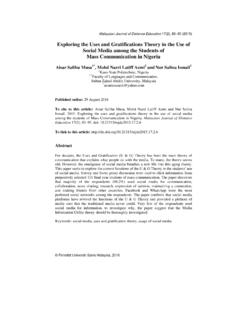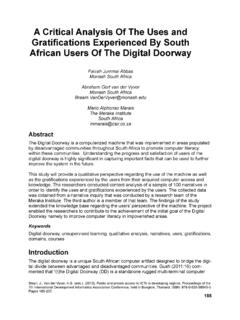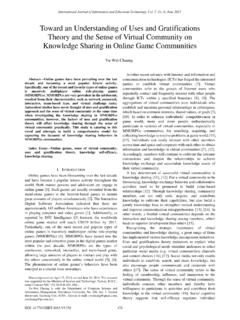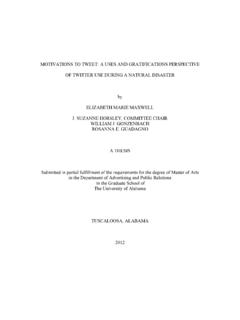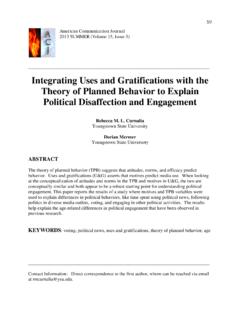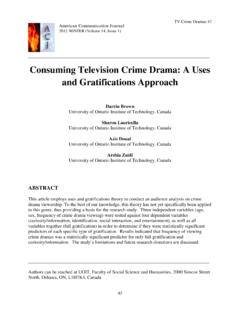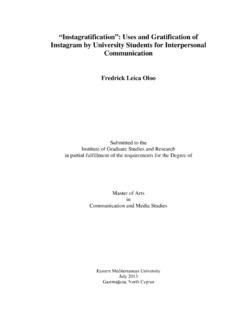Transcription of Acceptance of ERP Systems: The Uses and Gratifications ...
1 Vo l u m e 20, 2017 Accepting Editor Kay Fielden Received: July 9, 2017 Revised: October 19, November 2, November 13, December 12, 2017 Accepted: December 14, 2017. Cite as: Hasan, B. (2017). Acceptance of ERP systems: The uses and Gratifications theory perspective. Informing Science: the International Journal of an Emerging Transdiscipline, 20, 259-275. (CC BY-NC ) This article is licensed to you under a Creative Commons Attribution-NonCommercial International License . When you copy and redistribute this paper in full or in part, you need to provide proper attribution to it to ensure that others can later locate this work (and to ensure that others do not accuse you of plagiarism).
2 You may (and we encour-age you to) adapt, remix, transform, and build upon the material for any non-commercial purposes. This license does not permit you to use this material for commercial purposes. Acceptance OF ERP SYSTEMS: THE uses AND Gratifications theory PERSPECTIVE Bassam Hasan University of Toledo Toledo, OH, USA ABSTRACT Aim/Purpose This study aims to provide a better understanding of individual Acceptance of enterprise resource (ERP) systems. Based on the uses and Gratifications theory (UGT) and informing science theory , the study developed and empirically tested a research model to explain the effects of ERP characteristics (specifically, in-formativeness and enjoyment) on ERP Acceptance and use.
3 Background Individual Acceptance of ERP systems is crucial for achieving the benefits asso-ciated with ERP systems. Unfortunately, little research has focused on ac-ceptance of ERP systems at the individual level. This study attempts to fill this void. Methodology A survey questionnaire was distributed to ERP users to collect data to empiri-cally test the research model developed in this study. In addition to demograph-ic and background information question, the survey contained instruments to measure the study variables. Contribution The empirical results show that UGT provides a sound theoretical framework for explaining users Gratifications , attitudes, and behavioral intentions toward adopting and using an ERP.
4 These results support the view that subsumes in-formation systems and other fields that endeavor to inform their audience. Findings Individuals perceptions of the informativeness and entertainment of ERP sys-tems demonstrated strong direct effects on attitude toward using and satisfac-tion with ERP systems. In turn, satisfaction with ERP systems showed a direct significant impact on intention to use an ERP system. Recommendations for Practitioners Maintaining a favorable environment and designing training workshops that highlight the information and enjoyment aspects of an ERP can boost users perceptions of ERP informativeness and enjoyment and, eventually, improve their attitude and satisfaction with an ERP.
5 Recommendation for Researchers Researchers should test the proposed research model with other types of ERP systems and in different environments to enhance the generalizability of the results to other systems and settings. ERP Acceptance : UGT Perspective 260 Impact on Society The results of is study can be used as a foundation on which to develop plans and design strategies to enhance individual Acceptance of ERP systems and re-alize the benefits associated with these systems. Future Research Future research should extend the research model by integrating other personal and technology variables to provide further insights into what influences indi-viduals to accept or reject an ERP system.
6 Keywords enterprise resource system (ERP), uses and gratification theory (UGT), in-formativeness, enjoyment, attitude, satisfaction, intention to use ERP systems INTRODUCTION While Enterprise Resource Planning (ERP) systems are diverse and come in different capabilities and sizes , they refer to organization-wide integrated information systems that are used to improve the efficiency and effectiveness of business process es by capturing real time busin ess data and providing accurate, timely, and consolidated data throughout the organization (Saad , Nijher, & Sharma, 2017). The implementation and use of enterprise resource planning (ERP) systems as tools to gain valuable operational and competitive advan tages is on the rise across businesses.
7 The main benefits of ERP systems include enhancing decision-making, streamlining operations, accelerating fulfillment of cus-tomer orders, improving information visibility, flow, and accessibility throughout the business. When ERP systems are fully-utilized, they can increase employees productivity and organizational efficien-cy and effectiveness (Coulson, Olfman, Ryan, & Shayo, 2010; Ram, Corkindale, & Wu, 2013; Zabu-kovsek & Bobek, 2013). Unfortunately, the organizational adoption and implementation of ERP sys-tems do not automatically guarantee the desired improvements in business competitiveness. The lit-erature is rife with examples of ERP implementations that ended up in total failure and resulted in substantial losses of organizational resources (Saad et al.)
8 , 2017). While the causes of ERP failures are numerous, most failures and variations in the success rates of ERP implementations have been linked to the extent to which users are willing to accept and use these systems (Hwang & Grant, 2011). Thus, individual characteristics, attitudes, and behavioral in-tentions of the users who are expected to use those systems are critical to the utilization and success of ERP systems (Shih, 2006). Similarly, users perceptions of an ERP system can have a great impact on the degree to which the ERP implementation efforts succeed or fail (Abdinnour-Helm, Lengnick-Hall, & Lengnick-Hall , 2003; Hwang & Grant, 2011; Longinidis & Gotzamani, 2009).
9 Consequently, the lack of users Acceptance and under-utilization of ERP systems have been consistently identified as key factors contributing to the failure of ERP implementations and the inability of businesses to recoup the investments that were made in these systems (Nah, Tan, & Teh, 2004). Therefore, re-searchers have consistently called for increased attention to individual and behavioral factors that can boost or hamper users perceptions and Acceptance and utilization of ERP systems. Despite the substantial and still growing body of literature on users Acceptance and utilization of ERP systems, the causes of ERP under-utilization and failure are still poorly understood (Calisir & Calisir, 2004; Ram et al.)
10 , 2013; Shih, 2006). Moreover, the majority of past ERP Acceptance studies have relied heavily on the technology Acceptance model (TAM) (Davis, 1989) as a theoretical frame-work ( Gara a, 2011; Mayeh, Ramayah, & Mishra, 2016; Zabukovsek & Bobek, 2013). While past studies provide valuable insights into understanding users ERP Acceptance , other factors and theo-retical frameworks might offer valuable insights into users perceptions of ERP systems (Hwang & Grant, 2011; Nah et al., 2004). Thus, research aimed offering new insights to understanding users Acceptance and adoption of ERP systems is vital for understanding and improving ERP success.

